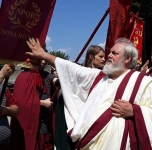Collegium pontificum (Nova Roma)
Home | Latíné | Deutsch | Español | Français | Italiano | Magyar | Português | Română | Русский | English
⚜⚜⚜ Site Index - Key Pages ⚜⚜⚜
·The People's Assembly·
Comitia Curiata
Comitia Centuriata
Comitia Populi Tributa
Comitia Plebis Tributa
Collegium Pontificum
Collegium Augurum
· Judiciary court · Administrative court · Constitutional court ·
The Collegium Pontificum (College of Pontiffs) is the supreme body for matters relating to the sacra publica of Nova Roma. It consists of nine pontifices who serve the public rites of the State religion and have general authority to determine the structure and nature of both the public rites and the priesthoods themselves. Voting members are the twelve flamines, six virgines Vestales and the rex sacrorum. They act as the general oversight committee for the public rites of the religio Romana and appoint members of the various priesthoods. Some specific administrative duties of the Collegium include: advising the Senate on religious matters, setting the dates of religious festivals, organizing and assisting the Priesthood, and acting as the final arbiters of Sacred Law and religious disputes. It may be called to order by any pontifex, and all the above listed members of the Collegium are able to vote.
Office of the Pontiffs
For administrative inquiries (priesthood applications, ritus requests, etc.) contact the Pontifices.
Current Membership in the Collegium Pontificum
The current members of the Collegium Pontificum are:
Rex sacrorum
The rex and regina sacrorum (King and Queen of the Sacred) are a legally married couple that perform various public rites and make announcements of festival days. First among the Priests and members of the collegium pontificum, but subordinate to the pontifex maximus. The rex and regina sacrorum may hold no political posts.
Pontifices
Pontifices, along with the other members of the Collegium Pontificum oversee most of sacra publica conducted on behalf of Nova Roma and its People. The title pontifex comes from the Latin for "bridge builder", a possible allusion to a very early role in placating the Gods and spirits associated with the Tiber river, and in building a spiritual bridge between men and the Gods. They are responsible for advising magistrates and private citizens on the performance of public and private rites.
The Pontifex Maximus acts as the Speaker for the Collegium Pontificum, oversees the Comitia Curiata and ritual responsibilities along with the Vestal Virgins.
(5 positions filled, 10 available (5 plebeian, 5 patrician))

|
Gaius Petronius Dexter
Pontifex Maximus |

|
Quintus Fabius Maximus
Pontifex |

|
Quintus Caecilius Metellus Pius Postumianus
Pontifex |

|
Gnaeus Cornelius Lentulus
Pontifex |

|
Marcus Claudius Marcellus
Pontifex |

|
Gaius Petronius Stephanus Turpilianus
Pontifex |
Flamines
The flamines are thirteen high priests who serve specific deities - though they are allowed to worship other deities as well. The sources tell us that a flamen was a sacerdos proper, and who was dedicated to the service of a particular deity. A number of sources fix the number of flamines at fifteen (three maiores and twelve minores), however the names of only thirteen of these are known with certainty. The flamines hold public rites on the days sacred to their deity, and oversee the general worship of that deity. The flamines are present in the Collegium Pontificum.
Flamines Maiores
Flamen Dialis
Position not open at this time. The Flamen Dialis serves the cult of Jupiter, and participates in the Vinalia festivals and at conferratio marriage ceremonies. This priesthood is subject to a large number of complex taboos which have not yet been resolved for reconstruction. The wife of the Flamen Dialis was known as the Flaminica Dialis, and assisted in the rites and was subject to the same taboos.
| POSITION NOT OPEN
|
Flamen Martialis
The Flamen Martialis oversees the cult of Mars, the God of War, leading public rites on the days sacred to Mars.
| POSITION OPEN
|
Flamen Quirinalis
The Flamen Quirinalis oversees the cult of Quirinus, a god related to the peaceful aspect of Mars, who presides over organized Roman social life. The Flamen Quirinalis leads public rites on the days sacred to Quirinus.
| POSITION OPEN
|
Flamines Minores
Flamen Carmentalis
The Flamen Carmentalis oversees the cult of Carmenta (Carmentis), a goddess of Prophecy and Oracles. The Flamen Carmentalis leads public rites on the days sacred to Carmenta.

|
Marca Hortensia Maior Fabiana Faustina
Flamen Carmentalis |
Flamen Cerealis
The Flamen Cerealis oversees the cult of Ceres, Goddess of grains (identified with the Greek Demeter). The Flamen Cerealis leads public rites on the days sacred to Ceres.
| POSITION OPEN
|
Flamen Falacer
The Flamen Falacer oversees the cult of the God Falacer.
| POSITION OPEN
|
Flamen Floralis
The Flamen Floralis oversees the cult of Flora, the Goddess of flowers, and Spring (and therefore new beginnings). The Flamen Floralis leads public rites on the days sacred to Flora.

|
Marcus Aurelius Cotta Iovius
Flamen Floralis |
Flamen Furrinalis
The Flamen Furrinalis oversees the cult of Furrina, a Goddess of Springs who had a sacred grove associated with water (possibly connected with health and healing). The Flamen Furrinalis leads public rites on the days sacred to Furrina.
| POSITION OPEN
|
Flamen Palatualis
The Flamen Palatualis oversees the cult of Palatua, the guardian of the Palatine Hill (the oldest settled part of Rome, therefore making Palatua possibly a goddess of Rome's beginnings.) The Flamen Palatualis leads public rites on the days sacred to Palatua.
| POSITION OPEN
|
Flamen Pomonalis
The Flamen Pomonalis oversees the cult of Pomona, Goddess of fruit. The Flamen Pomonalis leads public rites on days sacred to Pomona (there was no major single festival day).
| POSITION OPEN
|
Flamen Portunalis
The Flamen Portunalis oversees the cult of Portunus, God of Harbors and doors. The Flamen Portunalis leads public rites sacred to Portunus.

|
Gaius Petronius Dexter
Flamen Portunalis |
Flamen Volcanalis
The Flamen Volcanalis oversees the cult of Volcanus (Vulcan), God of Fire and smithcraft. The Flamen Volcanalis leads public rites sacred to Volcanus.
| POSITION OPEN
|
Flamen Volturnalis
The Flamen Volturnalis oversees the cult of Volturnus, a River God sometimes also associated with the Southeast wind. (Both these aspects may be related to travel and trade.) The Flamen Volturnalis leads public rites sacred to Volturnus.
| POSITION OPEN
|
Virgines Vestales
A priesthood of six women who guard the Sacred Hearth of Rome. The Vestal Virgins oversee the cult of Vesta, Goddess of the Hearth and Fire, and lead public rites sacred to Vesta. The duties of the Vestals included maintaining the fire in the Sacred Hearth of Rome, and making Mola salsa (sacred cakes made from spelt flour used in public rites.)
The Vestals also guarded some sacred objects, including the Palladium (an ancient image of Pallas Athene said to have been rescued from Troy). In ancient Rome the Vestals were virgins — in Nova Roma this has been replaced by a voluntary vow of chastity for the duration of office. Until Nova Roma has a central hearth, the Vestals each keep a Sacred Flame as a symbol of the Sacred Hearth of Rome. The Vestals receive great public respect for their work, and are entitled to be proceeded by Lictors.
The Chief Vestal oversees the efforts of the Vestals, and is present in the Collegium Pontificum.
| POSITION OPEN
|
(six positions, one filled, five available)
Past Vestals: (honoured for their former vows and duties)
- C. Maria Caeca
- Maxima Valeria Messallina
- Vespasia Pollia
- Prima Lucilla Cornelia Fortunata
- Gaia Iulia Caesaria Victorina
- L. Modia Lupa